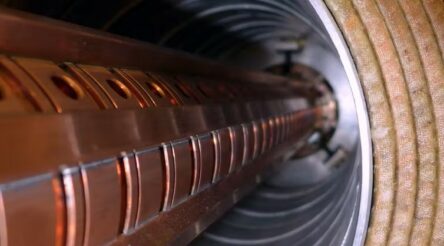Defence partnering for success – Riding the AUKUS wave, part 2 By Sarah Pavillard

Yesterday in Part 1 of this two-part analysis, Sarah Pavillard outlined the policy needed to support SMEs into AUKUS supply chains. Today, as we continue our sponsored series reporting BAE Systems Australia's Partnering for success defence industry supplier event, she argues that industry needs to come to the party too.
The AUKUS agreement is a major shot in the arm for regional stability, however, the ultimate strategic value of AUKUS cannot be realised without key industry enablers such as trusted international business-to-business partnerships.
Governments need to do their part to create the right policy, regulatory, and programme settings, but industry has to do their bit too.
AUKUS creates an unprecedented opportunity for development of Australia's military and defence industrial capability, and for collaboration, cooperation and co-working between Australia, American and British businesses.
But it will not work without direct engagement and partnership between SMEs that are going to be form the industrial backbone of the agreement.
The announcement of the optimal pathway to Pillar 1 of AUKUS — the planned purchase of three-to-five Virginia class submarines, and for the design, construction and delivery of the SSN-AUKUS as a nuclear-powered submarine capability — has electrified the Australian defence sector and garnered much commentary in the media.
While the more immediate benefits of Pillar 2 have been given far less attention, Pillar 2 is all about AUKUS nations collaborating on advanced technology in areas such as undersea robotics, quantum technologies, artificial intelligence, advanced cyber, hypersonic, and counter-hypersonic capabilities, electronic warfare, innovation, and information sharing.
Australia has committed up to $368 billion under Pillar 1 of AUKUS to acquire, operate and maintain nuclear-powered subs with the associated infrastructure that is required, but that commitment is only for Pillar 1.
The scale of investment that will be made to support the Pillar 2 advanced technologies is yet to be announced, but will no doubt be substantial – submarines are a major plank of AUKUS, but they are not the only one.
The scale of the opportunity means that there has never been a better time for American and British businesses to enter the Australian defence market as partners with local businesses, rather than as competitors.
Micro-Partnerships are less costly and more agile
To make this happen, micro-partnerships must be established to maximise the contribution of all levels of the AUKUS economies. There is a growing demand in Australia for skilled workers with defence expertise as the industry continues to expand.
Business-to-business micro-partnerships between American, British and Australian SMEs offer significant benefits to companies and individuals. These collaborations facilitate trust transfer, allow access to expertise and knowledge, and provide high value with lower overhead costs.
Micro-partnerships also enable capability pooling, increased flexibility, and access to new markets and customer bases.
SMEs can particularly benefit from micro-partnerships, leveraging the existing networks of their partners to achieve their objectives.
By co-working with complementary skills and capabilities, both parties can benefit from shared expertise and learn together, leading to more innovative outcomes. Australian SMEs need to be forging these partnerships now if they want to ride the wave.
We must get this right
Australia is a maritime nation. As the 19th century military strategist, Sir Julian Corbett noted, strong naval capability is the only route to national prosperity for maritime nations who depend on unfettered access to sea lanes for trade.
AUKUS is a major investment in Australia’s maritime capability that can be used to start a fire beneath Australian industry that can blaze into an inferno of economic prosperity if we properly harness it.
If Australia wants to reap the benefits of the AUKUS agreement and shore up our national prosperity for generations to come then two things need to happen: the government needs to provide more support to its defence SMEs and these SMEs must partner with their American and British counterparts to access the capability, expertise, and knowledge that resides overseas and bring it here.
The US government's support for its SMEs in the defence industry far exceeds that provided by the Australian government, which needs to do more to help the sector succeed.
Additionally, ITAR regulations are a significant hurdle to technology transfer and skills acquisition in the Australian defence sector.
The AUKUS agreement offers a unique opportunity to address these issues create the conditions in which Australian businesses can thrive, but it will require a concerted effort from both government and industry to achieve this goal.
Further reading:
DEFENCE PARTNERING FOR SUCCESS – RIDING THE AUKUS WAVE, PART 1 BY SARAH PAVILLARD
SME DEFENCE COMPANIES THE KEY TO AUKUS SUCCESS – REPORT
INDUSTRY NEEDS TO PREPARE TO GROW WITH DEFENCE NEEDS – BY SARAH PAVILLARD
Picture: defence.gov.au/AUKUS nuclear-powered submarine
@AuManufacturing's series Defence industry partnering for success is sponsored by defence sector prime contractor BAE Systems Australia.
![]()
Topics Analysis and Commentary Defence
@aumanufacturing Sections
Analysis and Commentary Awards casino reviews Defence Gambling Manufacturing News Online Casino Podcast Technology Videos





